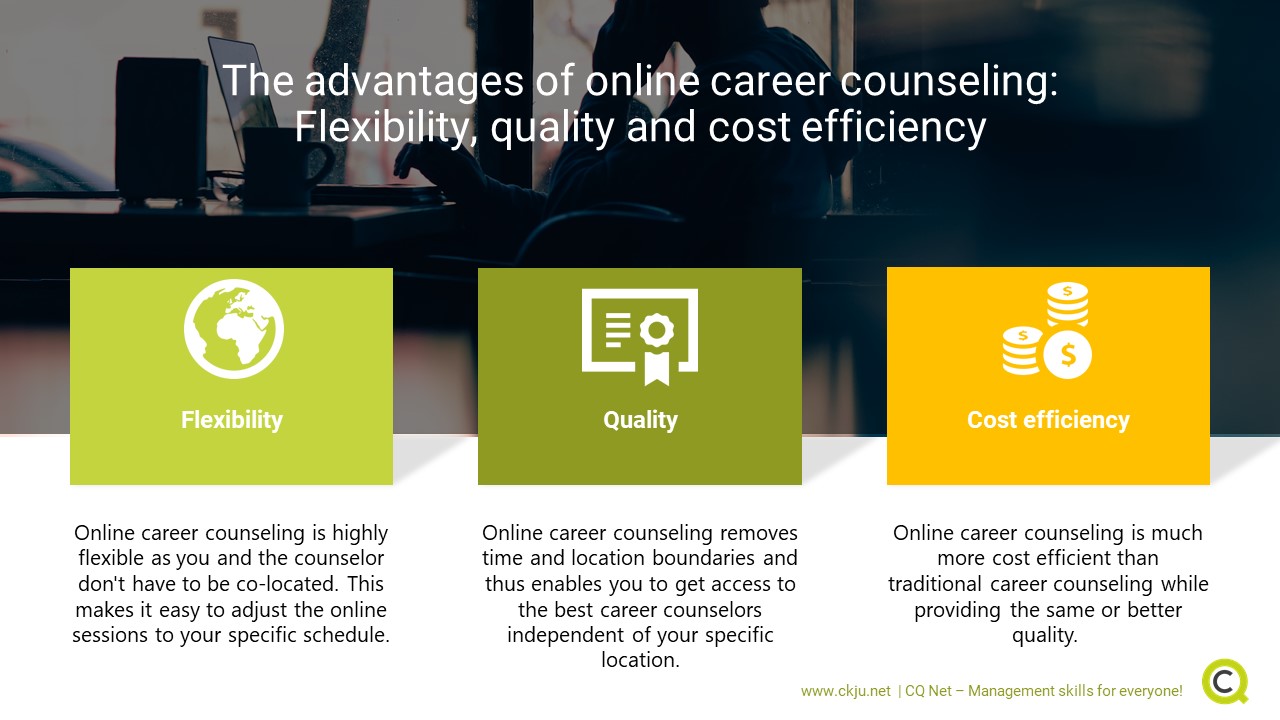At CQ Net – Management skills for everyone! we believe that counseling services for career and personal development should be available and affordable to help you gain a competitive edge for your next steps. Beyond in-depth research and online management training, we offer various one-on-one services on specific topics, including personality counseling, leadership counseling, career counseling and organizational development counseling. With our practical know-how and evidence-based knowledge, we help you to tackle your challenges with a clear advantage! Interested? Choose one of our One-on-One Career Counseling sessions or learn more about Career Counseling, its advantages and how it works here.
Career counseling: instant help for work problems
Career counseling and guidance: From job application to starting a new job
Career counseling for personality development: learn about your personality traits, strenghts and weaknesses to kick-start professional growth
Career counseling on leadership and personality: Learn about your leadership traits to improve your leadership effectiveness
Contents
- What is career counseling?
- What are the benefits of career counseling?
- How does career counseling work?
- What types of career counseling do exist?
- When should I consider career counseling?
- What makes a good career counselor?
- Whom is career counseling for?
- How long does career counseling take?
- Why should I consider career counseling?
- How much does career counseling cost?
- Where specifically can career counseling help me in my job?
- How does online career counseling work and what are the advantages compared to traditional career counseling?
- References and further reading
What is career counseling?
Practitioners with a strong background in career management and organizational behavior/psychology give advice to clients concerning work-related issues. They help clients make decisions concerning their careers, such as career exploration, career choices, career development and the management of career changes. Career counseling is similar to other types of counseling (e.g., clinical counseling) because the professional providing advice is skilled in utilizing techniques such as good listening skills and also has expert knowledge of the topic.
Having worked as professionals in the private and NGO sector for a considerable time themselves, career counselors at CQ Net - Management skills for everyone! combine the practical experience and academic fundamentals to help you navigate through the challenges in contemporary organizations. There is more than meets the eye in organization. Career counseling helps you to see the invisible and use this knowledge to boost your career and personal growth.
What are the benefits of career counseling?
Career counseling is beneficial for short-term and long-term success in your professional life. Spending time with a career counselor enables you to recognize your value as a professional, find a new job, get a promotion or just get advice concerning work-related issues from an expert. It allows you to reflect on the knowledge, skills, and abilities that you possess to allow you to map a career path that is aligned with your values. A career counselor will develop a relationship with you to identify your personality, values and interests so that you have a career that is fulfilling and challenging. Career counseling can help you assess your overall strengths and limitations as job candidates in the labor market and with overall career development (Feldman, 2001).
How does career counseling work?
Career counseling is a long-term process and starts with the career counselor engaging with you in conversation to find out more about your career interests, personality, background and work-related issues that are important for you. Typically, you complete a series of tests such as a personality inventory and vocational measure to assess your career potential. The career counselor will work with you to understand what motivates you to perform well and to identify careers that suit your personality type. Based on the model of Parsons (1909, as cited in Erdheim et al., 2007), career counseling focuses on three main principles:
- To enable the client to understand themselves, their knowledge, skills and abilities (KSAs), interests, resources, and limitations
- For the client to acquire a knowledge of the requirement and conditions of success, opportunities and prospects as well as disadvantages across different career trajectories and
- reflection and clarification of the gap between 1 and 2.
Career counseling draws on the principles of Carl Rogers and positive psychology through the counselor guiding the client to reach their own decisions and increasing self-awareness in terms of career development (Chen, 2001). The focus is on individual self-development with the career counselor creating an atmosphere in which the client expresses their thoughts and feelings (Mahoney & Baker, 2002).
What types of career counseling do exist?
Career counseling is very broad and includes a variety of activities to enable individuals to deal with challenges in their career. Career counsellors can focus on helping individuals who are new to the job market in order to explore careers, help individuals find employment, and assist experienced individuals who seek a career change. The Network for Innovation in Career Guidance and Counselling in Europe (NICE) describes five roles for career counselors including:
- Career Educator – helping clients develop their career management competencies;
- Career Information and Assessment Expert – helping clients assess their personal characteristics and needs; and
- Career Counsellor – supporting clients to understand their work situations and to provide solutions.
- The other two roles focus on changing policy and practice.
When should I consider career counseling?
Career counseling is useful when you are uncertain on which path to take in your career development. Having a consultation with a career counselor allows you to discuss your concerns and find solutions to career issues so is a useful path to take to relieve the stress of uncertainty. A career counselor can provide a plethora of skills such as helping you find a new job and help you overall with career development. Career Counseling can be useful in increasing your self-efficacy and help you navigate through important career decisions so is helpful for your professional well-being. Examples where a career counseling session can help you include:
Career counseling helps you find a new job
You just finished university and are looking for your first job? You are searching for new challenges and thus want to change jobs? You lost your job and want to find a new one that fits your career expectation? Our career counselors can help you along the way to your dream job in a variety of ways. How do we achieve this?
- First, we can help you to identify your skills, talents, strengths and weaknesses important to boost your career and personal growth.
- Second, we help you to navigate rigorous recruitment and selection procedures and to use them for your advantage.
- Third, we know how organization tick, what is important to them and how they hire, promote and develop people.
Career counseling helps you to overcome work-related issues
A considerable amount of people report that they are not satisfied with their job due to factors such as abusive supervision, conflicts with their co-workers, a stressful work environment or a lack of social support. In a first step, our career counselors help you to understand the root cause of the work-related issue. In a second step, we will develop an action plan together with you to address the issue in an effective and efficient manner. However, having an action plan alone won't solve the issue. In regular review sessions our career counselor will discuss with you the progress made and, if necessary, adjust the action plan in a way such that we achieve the agreed-upon objective.
What makes a good career counselor?
A good career counselor is someone who works with the client to help them identify an optimal career trajectory. In fact, a good counselor is someone who seeks equal involvement from the client (Duarte, 2018). To quote Duarte, “the counselor breaks the modus faciendi, stops being the all-powerful professional, and establishes a relationship of usefulness with the client.” (p.260, Duarte, 2018). Good career counselors use the principle of ‘guide, coach, dialogue,’ so there is a flow of conversation between themselves and clients in order to guide clients through their career development journey.
Whom is career counseling for?
Career counseling is useful for a wide range of people. Career counselor can provide guidance to individuals who are starting a career. If you are looking to change direction, then career counselling can help. If you wish to plan for the future in terms of promotions and future career development, then career counseling is appropriate.
How long does career counseling take?
There is research to show that career counseling interventions are effective (Brown & Ryan Krane, 2000) based on meta-analytic reviews. A recent study found that four to five one-hour weekly sessions were effective for long-term career advancement (Perdrix et al., 2012). They found that over a one-year time span, there was a continual decrease of career indecision and an increase in career stabilization with the majority of clients implementing their career choice within a period of one year. Consequently, success can be attained with as few as 4-5 sessions and can be modified to suit the client’s needs.
Why should I consider career counseling?
Based on empirical research, career counseling is very useful to help you with your long-term career success. Many studies have shown that spending time with a career counselor can result in effective outcomes. A meta-analytic review on the efficacy of career choice interventions found that those who participated in career counseling had a stronger vocational identity, career maturity and career decidedness compared to those who did not participate (Whiston, Yue, Mitts & Wright, 2017). Career choice interventions had their strongest impact on career decision-making self-efficacy (Whiston et al., 2017). So overall, it is beneficial to you to consider career counseling because it will boost your motivation and also result in you making the best decisions regarding your career.
How much does career counseling cost?
According to Motley Fool, career counseling typically costs $75 to $150 per hour, depending on the experience of the counselor and the issues that need to be addressed.
Where specifically can career counseling help me in my job?
Career counseling can help in a variety of ways. Although you don’t necessarily need to have a specific goal before you meet with a career counselor, it can help to think of some possible areas that need a remedy and will benefit your career. Reflecting on your needs before meeting with a counselor can help you ascertain exactly which areas need improvement. This self-reflection before the initial session can improve the quality of the interactions with the career counselor.
How does online career counseling work and what are the advantages compared to traditional career counseling?
The availablity of high-speed internet, video conferencing systems and online collaboration tools make it possible to conduct online career counseling sessions independent of location and time zone. At CQ Net - Management skills for everyone! we utilize cutting-edge technology to provide you an exceptional online career counseling experience. After you signed-up for one of our career counseling sessions we will get back to you personally to arrange the registration process, get a better understanding of your expectations and arrange the times and dates for your online sessions. Online career counseling has a set of advantages compared to a traditional face-to-face career counseling approach:
- Flexibility: Online career counseling is highly flexible as you and the counselor don't have to be co-located. This makes it easy to adjust the online sessions to your specific schedule and, if necessary, even conduct an online session at short notice without traveling hours to meet each other.
- Quality: Whether career counseling pays of or not strongly depends on the qualification and experiene of your counselor. Online career counseling removes time and location boundaries and thus enables you to get access to the best career counselors independent of your specific location.
- Cost efficiency: Online career counseling is much more cost efficient than traditional career counseling while providing the same or better quality.
References and further reading
Brown, S.D., & Ryan, Krane N.E. (2000). Four (or five) sessions and a cloud of dust: Old assumptions and new observations about career counseling. In S.D. Brown, R.W. Lent (Eds.), Handbook of counseling psychology, Wiley, New York, NY (pp. 740-766
Chen, C. P. (2001). Exploring meanings: combining humanistic and career psychology theories in counseling. Counseling Psychology Quarterly, 14, 317-330.
Duarte, M. A. (2018). Life Design Paradigm. In Shigemasu, K (Ed). Diversity in Harmony – Insights from Psychology. Chichester, UK: John Wiley & Sons, 255-67.
Feldman, D (2001). Career Coaching: What HR Professionals and Managers Need to Know. HR. Human Resource Planning 24.2, 26-35.
Mahoney, K. T., & Baker, D. B. (2002). Elton Mayo and Carl Rogers: a tale of two techniques. Journal of Vocational Behavior, 60, 437-450
Perdrix, S., Stauffer, S., Masdonati, J., Massoudi, K., & Rossier, J. (2012). Effectiveness of Career Counseling: A One-year Follow-up. Journal of Vocational Behavior 80, 2, 565-78.
Whiston, S. C, Li, Y., Mitts, N. G., & Wright, L. (2017). Effectiveness of Career Choice Interventions: A Meta-analytic Replication and Extension. Journal of Vocational Behavior 100, 175-84.






